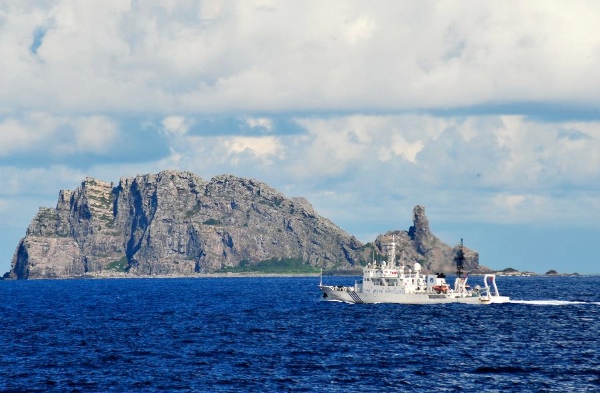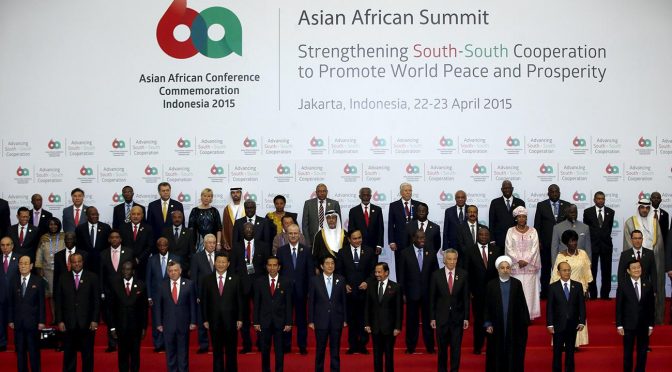Self determination for countries in Asia and Africa is now unstoppable. No longer will decisions be coming from regional representatives of the West as it was always the case decades ago.
The mechanisms for the implementation of worldwide development, well, they’ve been here all along, are now being revitalized.
Without the Khazarian Mafia/ Jesuit/CIA’s interference and geopolitical intrigues, we would not have wasted 60 years on regional turmoils and ethnic conflicts.
To ensure that no amount of political pressure could influence the East’s journey towards prosperity for all, both Chinese and Russian military organizations are now in the process of being integrated synergistically.
Together, the sheer number of fully equipped Chinese infantry battalions and the technologically advanced Russian air power should be more than enough deterrence against outsiders’ blinded attempts on furthering their colonial ambitions.
Asia-Africa synergy crucial for south-south ties
April 24, 2015, 8:46 am
![Chinese President Xi Jinping (8th L, front) and other leaders and representatives pose for a group photo at the opening ceremony of the Asian-African Summit in Jakarta, capital of Indonesia, April 22, 2015 [Xinhua]](http://thebricspost.com/wp-content/uploads/2015/04/XxjiweE000002_20150423_BNMFN0A001_11n.jpg)
The “solidarity, friendship and cooperation” (or the “Bandung Spirit”) developed at the conference have strengthened the national liberation movements of Asian and African people and guided them to pursue solidarity and cooperation. The Bandung Spirit has also powered humankind’s fight for good causes.
After 60 years, Asian and African leaders and representatives have gathered again in Bandung to negotiate friendly cooperation, development and discuss issues of common concern. Their meeting is expected to inject more power into the “colossal ship” of Asian-African cooperation.
Given the changes in the world order, Asian-African cooperation today goes beyond the geographic scope and is of even more global significance. Aside from being the cradles of civilization, Asia and Africa account for more than half of the United Nations member states and are home to three quarters of the world’s population. With a third of world’s economic output, Asian as well as African countries are now at a crucial stage of development and moving toward a better future.
These similarities have made it necessary and possible for Asian and African countries to develop a common security and crisis perspective, and help each other on the basis of reciprocity and mutual benefit to seek common development. As good partners, Asian and African countries should pursue common grounds by shelving their differences and forging a new and broader pattern for multi-layer and all-round cooperation.
Cooperation between Asian and African countries will set a good example for broader South-South bonding. Since the rise of emerging markets and developing countries will create new opportunities for South-South cooperation, Asian and African countries should consolidate their relations and deepen their cooperation with developing countries in Latin America and the South Pacific region using the Non-Aligned Movement and Group of 77 mechanisms.
They should also use the Conference on Interaction and Confidence Building Measures in Asia and the BRICS platform to establish a new framework for South-South cooperation in order to increase the representation of and give more say to developing countries in global mechanisms and better safeguard their rights and interests.
Aside from carrying forward the Bandung Spirit, the cooperation between Asian and African countries will also promote South-North cooperation. Asian and African countries should take the lead in advocating mutual respect, stick to the new “common, comprehensive, cooperative and sustainable” security outlook, and urge developed countries to help the developing ones boost development and narrow the South-North gap so that a more balanced and new type of global partnership between developed and developing countries can be established.
China has been pushing forward Asian-African cooperation and is committed to safeguarding peace and stability in Asia and Africa. As a reliable friend of developing countries, China is also committed to promoting solidarity and cooperation among Asian and African countries.
Sixty years after the Bandung Conference, Asian and African countries have started a new journey of cooperation. The fruitful cooperation between Asian and African countries in the past will boost their confidence and lead them toward a better future.
Just as President Xi Jinping said to commemorate the Bandung Conference, the Bandung Spirit is not outdated; instead, it will acquire new and strong vitality. In this spirit, Asian and African countries should work together to build a brighter future for their peoples and those in other parts of the world.
This article first appeared in China Daily.
China-Russia hold security meet on north-east Asia
April 24, 2015, 5:15 am

Assistant Chinese Foreign Minister Liu Jianchao and Russian Deputy Foreign Minister Igor Morgulov co-chaired the first Sino-Russian consultation meet on northeast Asia security in Shanghai on Thursday.
China, Japan and South Korea are key north-east Asian countries. There has been renewed urgency by the administration of Japan’s Prime Minister Shinzo Abe to reset frosty relations by coordinating bilateral summits with his Chinese and Korean counterparts, Xi Jinping and Park Geun-hye. China and South Korea had earlier jointly condemned Japanese Prime Minster Shinzo Abe’s visit to a controversial shrine honoring war criminals alongwith those who died in World War II.
Meanwhile, Russian and Chinese defense officials, along with foreign ministry representatives, were present at Thursday’s meet in Shanghai.
“The two sides discussed the security situation in northeast Asia, and agreed to enhance dialogues and coordination to promote peace and stability in the region,” said a Chinese Foreign Ministry statement.
Chinese President Xi Jinping and Japanese Prime Minister Shinzo Abe have met in Indonesia on Wednesday, although tensions between the two north-east Asian countries remain.
Defiant lawmakers from Abe’s ruling party and the opposition on Wednesday visited a Japanese war shrine in Tokyo that is seen in China and South Korea as a symbol of Tokyo’s past militarism.
Meanwhile, Chinese Defense Minister Chang Wanquan had met with his Russian counterpart Sergei Shoigu in Moscow last week where the two leaders pledged to push ahead with bilateral “pragmatic, comprehensive military cooperation”.
China’s President Xi Jinping has made a strong military a key plank of his plan for a revitalized China.
In Moscow last week, the Chinese Defense Minister said China needs a defense force matching its development needs and that a fair and just international order needs to be established.
“The Chinese People’s Liberation Army is an active contributor to world peace, stability and development. China is a constructive member in international security. With its growing economy, China needs a national defense and military force that is commensurate with its development needs, not only to safeguard national interests, but to improve its fulfilment of its international obligations,” the Chinese Defense Minister said.
China will raise its defense budget by around 10 per cent this year, an announcement made during the annual session of the country’s top legislature in March said.
Earlier this month, China became the first foreign customer of Russia’s most advanced air and missile defense system, the S-400 air and missile defense systems.
One of the significant sources of funds for the Cabal is the healthcare industry which registered a whopping $3.09 trillion in 2014, and is projected to soar to $3.57 trillion in 2017, in the US alone. We believe that this is just a conservative figure.
We can avoid using drugs, defeat any viral attack and scaremongering easily by knowing how to build our own comprehensive antiviral system. Find more about it here.


